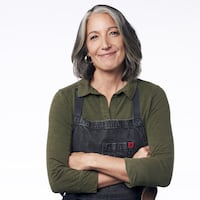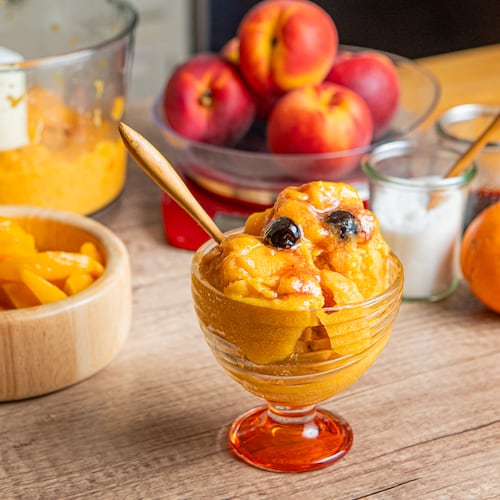This month, as we observe the achievements of African-Americans in U.S. history, we would be remiss not to reflect on Edna Lewis (1916-2006), arguably the most important black culinarian in the history of this country.
I never got to meet Lewis in person. Admittedly, it’s since I moved to the South a couple of years ago that her name began to surface regularly in my conversations with chefs and food writers. What has struck me in these chats is the deep admiration that this contemporary body of food professionals has for Lewis, particularly the role she played in championing, chronicling and preserving Southern food traditions.
Born in Freetown, Va., a community founded by former slaves, Lewis slugged through life and left glory in her wake. Upon the death of her father, she left her hometown at the age of 16, headed to Washington, D.C., and then to New York City. She earned her pennies ironing clothes (a gig that lasted all of a few hours), and then as a seamstress. There are fill-in-the-blank moments that you can Google, but among important ones, she opened a restaurant on Manhattan’s East Side, Café Nicholson, garnering aplomb and becoming somewhat of a celebrity.
Edna Lewis was a critical voice for blacks and their contributions to American cookery. Her cookbooks — “The Edna Lewis Cookbook” (1972), “The Taste of Country Cooking” (1976) and “In Pursuit of Flavor” (1988) — continue to serve as a lasting record for understanding what is a layered and complex Southern food narrative. Equally important, and some 12 years since her death in 2006, Lewis continues to inspire a new generation of chefs.
One such person she inspired is Mashama Bailey, executive chef and co-owner of The Grey in Savannah. Under the leadership of Bailey and her business partner, John Morisano, the contemporary Southern restaurant has garnered numerous awards and accolades since doors opened in late 2014. These include 2015 James Beard Foundation award nods as a semifinalist in the best new restaurant category and as a finalist for restaurant design. Digital media food and dining brand Eater named The Grey its 2017 Restaurant of the Year.
When I think of Edna Lewis “disciples” these days, I immediately posit Bailey in that group. I said as much to Bailey when we spoke on the phone. She laughed. But consider Bailey’s involvement with the Edna Lewis Foundation, whose mission, per its website, is “to revive, preserve and celebrate the rich history of African-American cookery by cultivating a deeper understanding of Southern food and culture in America.”
The foundation was established in 2012. Bailey joined the foundation a couple of years ago and replaced its founder, chef Joe Randall, as chairman of the board last fall. Around the same time, she and Morisano helped to establish the Edna Lewis Scholarship, which awards two culinary students at Savannah Tech up to $4,500 to support their studies.
Bailey also happens to be the chef tapped for the 2017 AJC Decatur Book Festival's Edna Lewis legacy cooking demonstration, where she whipped up Lewis' recipe for quail casserole. Bailey can laugh all she wants, but I can't think of a single chef in this state doing more than Bailey to promote the values, Southern kitchen love and home economics know-how that guided Lewis.
Bailey was born and raised primarily in New York. Her family has roots in Waynesboro, Ga., where, growing up, she spent summers with her grandmother. And Bailey attended grade school in Savannah. But Edna Lewis didn’t enter Bailey’s lexicon until 1999, while she was attending the Institute of Culinary Education in New York.
“I had to write an essay about someone who inspires us in food,” Bailey recalled. “I wanted to write about my grandmother because that’s kind of what got me into food. My instructor said, ‘It needs to be a chef. You can’t write about your family.’”
At the time, Bailey’s primary knowledge of the world of chefs was of famous faces from public TV cooking shows — Julia Child, Jeff Smith (aka “The Frugal Gourmet”), and the like. So Bailey hit the books.
“I went to a library up in Harlem and started doing research. I knew I was looking for a black chef and was, like, ‘There have to be a ton of them out there.’ But there weren’t. Then I found this article about Edna Lewis, probably written in the late 1990s, about her working in the South, her career and life and accomplishments.”
Bailey never did get to meet Lewis in person, but she has become a walking, talking Lewis library.
“Her whole mantra was about preserving Southern food and history, the practices of it all — growing the food, picking the food, cooking the food. She felt that was being lost,” Bailey said.
Preserving the heritage and tradition of cooking was the impetus for setting up the Edna Lewis Scholarship. Yet Bailey and Morisano wanted not only to provide scholarships for students on the path to become culinary professionals, but also to reach a demographic that mirrored Lewis’ own non-moneyed past, which is why they pegged students at Savannah Tech as recipients for funding. Savannah Tech is “local, right in our district, and the demographic affects and reflects all the businesses in Savannah,” Bailey said.
While the scholarship will hopefully assist aspiring culinarians to make a career in food, Bailey’s own work in the kitchen continues to show Lewis influences. Take, for example, Braised Lamb Shoulder with Kanni Spice, a dish on the menu at The Grey that Bailey adapted from Lewis’ Braised Leg of Mutton, a recipe published in “The Taste of Country Cooking.”
In the introduction to the recipe, Lewis gives a quick lesson in mutton matters: “When the miller announced he would butcher a sheep on a Saturday, you understood it would be mutton. It was usually available after the sheep had been sheared. Lambs were never butchered; they were sold off or kept for wool. Mutton, the meat of a sheep three years and older, has a stronger, more exotic flavor than ‘lamb’ and is very delicious when properly prepared.”
Lewis calls for rubbing a paste of butter, thyme and salt over the meat, letting it sit for an hour, then adding the mutton to a quart of boiling water seasoned with onions, garlic, cloves, peppercorns and a bay leaf. The whole thing is then put in an oven to cook for 3 hours. “The long, slow cooking will bring out the interesting flavor of the mutton while giving it a rich pale-brown color,” Lewis writes. The cooking liquid then gets reduced and used as a sauce for serving.
In her version of the recipe, Bailey substitutes mutton with easier-to-come-by lamb. She puts to work some other ingredients in Lewis’ original instructions, but in a different way. Rather than baste the meat with its cooking juices, Bailey uses a paste version of a spicy Senegalese sauce called kanni, made with tomatoes, serrano and ancho chiles, onion and garlic.
“I took it and made it my own,” Bailey said of Lewis’ recipe.
That deliberate decision, to make a “from here” recipe something that’s her own, is far more exciting to me than researching and resuscitating an Edna Lewis recipe.
Like many chefs in the South right now, Bailey holds a profound respect for what came before. She is well aware of the South’s culinary past — a tapestry, intricately interwoven, criss-crossed many times over, with influences borne from economic, racial, religious and other factors. But that doesn’t mean her own distinct voice should be muted.
About the Author
The Latest
Featured






